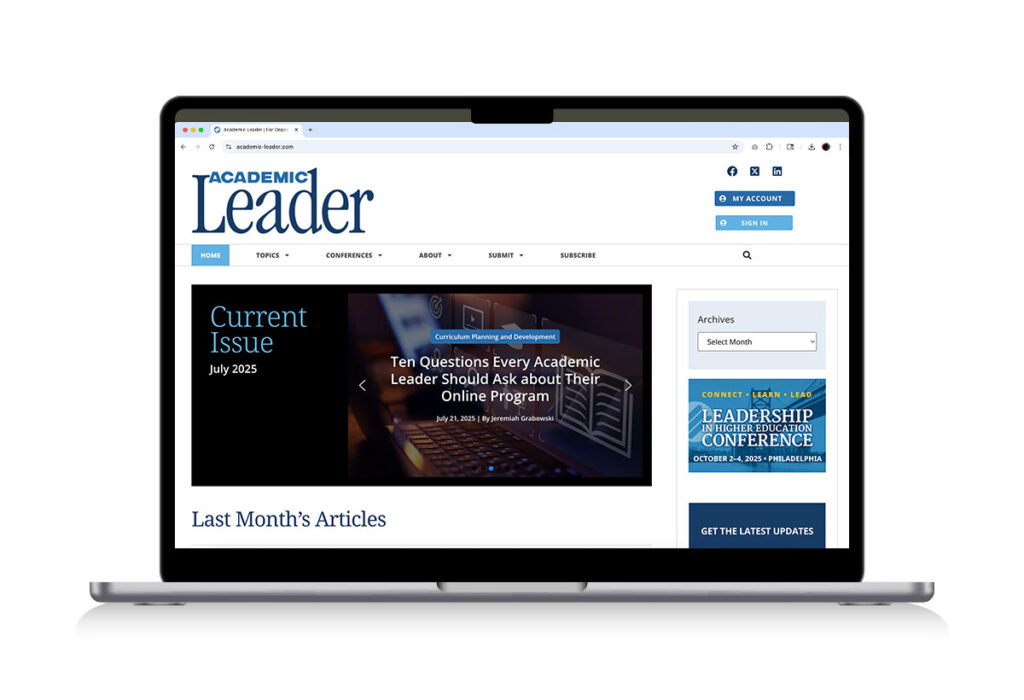Improving Support for Non-Tenure-Track Faculty
Academic administrators are well aware that the faculty has changed dramatically, with 70 percent of the faculty now off the tenure track (52 percent part-time and 18 percent full-time, non–tenure track) (American Association of University Professors, 2018). This transformation of academic positions over the past three decades has created an...
Adaptive Learning for Faculty Development: Technology Considerations
One challenge of faculty development and training for online teaching is satisfying instructors with different levels of knowledge, skills, and experience. At our institution, we discovered that this challenge can be overcome by employing an adaptive learning strategy in our faculty development courses. Adaptive learning technologies assess an individual learner’s...
The Value of Intergenerational Faculty Mentoring
For the most part, US higher education has not recognized the value of intergenerational workforce practices as a valuable source of expertise and transmission of institutional knowledge. But faculty mentoring programs are the exception: they represent one of the most highly developed intergenerational practices in higher education today. These programs...
Five Ways Administrators Can Show Faculty Support
In the summer of 2017 while I was teaching a graduate education course in China, in oppressive heat, my administrator provided cool water and fresh fruit—a small token that made a big impression on me. Having worked 42 years in educational institutions, I have witnessed what true administrative support feels...
It’s Not Just a Series of Workshops: Reevaluating Faculty Development to Improve Recruitment, Retention, and Tenurability of Faculty
In my experience with faculty recruitment at two very different academic institutions, I have learned that faculty candidates care a lot about what support they can expect for their professional development; it’s one of the most common questions I hear. Institutions typically hire faculty whom they want to keep and,...
The Role of Educational Developers in Teaching and Learning Excellence
Educational developers (EDs) are change agents. They play a crucial role in helping colleges and universities adapt and respond to change. As technology advances and attention to student success, retention, and completion grows, EDs play an essential role in supporting faculty in creating the best possible student experience. The role...
Planning Community-Based Faculty Training and Professional Development at Your Institution
External faculty development has many benefits for improving teaching and academic programs, but these courses and training also come with limitations. The direct creation of an academic institution’s own faculty training and courses is one practical option to expand faculty professional development opportunities aligned with evidence-based teaching practices, institutional needs,...
How to Talk to Faculty Who Receive Low Course Evaluations
This article is the second installment on conversations about course ratings. The first installment explored how to frame a discussion with a faculty member who receives average ratings semester after semester. This second scenario may be the most challenging for department chairs. It’s the conversation that needs to occur with a faculty...
Understanding Course Evaluations: Resources for Faculty and Chairs
Despite a great deal of research on course evaluations, institutional policies and practices are not always well informed by that research. Faculty are often not as informed as they should be either. Anecdotal evidence, myth and folklore tend to prevail. It’s good to encourage faculty to learn more about how...
Developing and Evaluating Teacher Effectiveness at Colorado State University
An international conversation around an increased focus on high-quality teaching at R1 institutions has been gaining momentum for several years. A recent shift in the conversation, focused on identifying fair and valid measures to evaluate effective teaching, continues to grow. On the one hand, individual departments and colleges look to...













